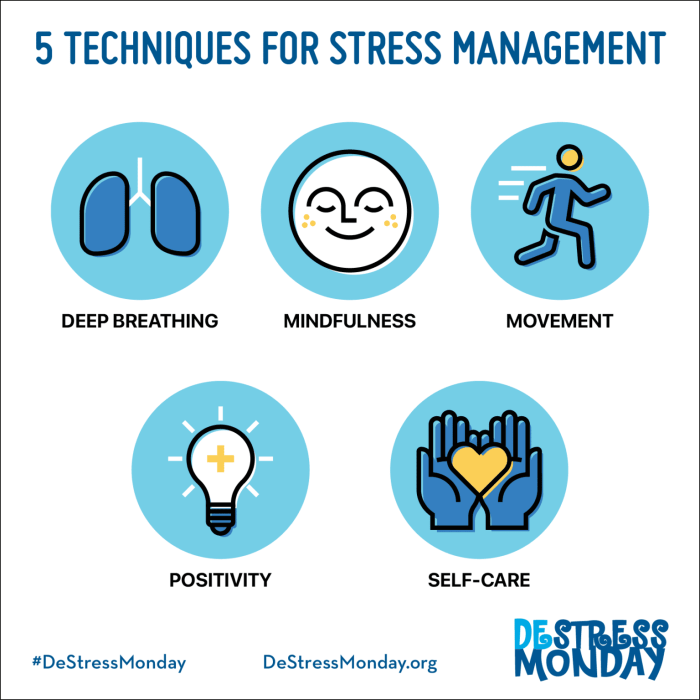Effective stress management tips take the spotlight in this guide that delves into various techniques, physical activities, mindfulness, and healthy habits, all aimed at helping you conquer stress like a boss. Get ready to level up your stress management game!
Effective stress management strategies

In today’s fast-paced world, stress has become a common issue affecting many individuals. It is crucial to have effective stress management strategies in place to maintain overall well-being and mental health.
Practice mindfulness and meditation
- Engage in mindfulness practices such as deep breathing, yoga, or meditation to help calm the mind and reduce stress levels.
- Allocate time each day to focus on the present moment and let go of worries about the past or future.
- Develop a regular meditation routine to promote relaxation and inner peace.
Maintain a healthy lifestyle
- Exercise regularly to boost endorphins and improve mood.
- Eat a balanced diet rich in fruits, vegetables, and whole grains to support overall health.
- Prioritize getting enough sleep to allow your body and mind to rest and recharge.
Establish boundaries and prioritize self-care
- Learn to say no to tasks or commitments that cause unnecessary stress.
- Set boundaries with work or personal relationships to maintain a healthy balance.
- Engage in activities that bring you joy and relaxation, such as hobbies or spending time with loved ones.
Physical activities for stress relief
Physical activities play a crucial role in reducing stress levels by releasing endorphins, improving mood, and promoting overall well-being. Regular exercise can help manage stress and anxiety effectively.
Different types of physical activities for stress relief
- Cardiovascular exercises like running, cycling, or swimming can boost endorphins and reduce stress.
- Strength training exercises such as weightlifting or bodyweight exercises can help release tension and improve mood.
- Yoga and Pilates focus on breathing and mindfulness, aiding in stress reduction and relaxation.
- Dance classes or group sports activities can provide social support and a fun way to relieve stress.
Tips for incorporating regular exercise into a busy schedule
- Schedule your workouts like appointments to prioritize physical activity.
- Find short, high-intensity workouts that can be done in a limited time frame for busy days.
- Combine exercise with other activities like walking meetings or lunchtime workouts to maximize time efficiency.
- Choose activities you enjoy to make exercise a rewarding and stress-relieving experience.
Mindfulness and meditation
Mindfulness is the practice of being fully present and aware of the current moment without judgment. It involves focusing on your thoughts, feelings, and surroundings, which can help reduce stress by promoting relaxation and mental clarity.
Different Meditation Techniques for Stress Relief, Effective stress management tips
- Guided Meditation: Listening to a recorded meditation that guides you through relaxation and visualization techniques.
- Body Scan Meditation: Bringing awareness to each part of your body, releasing tension and promoting relaxation.
- Mindfulness Meditation: Focusing on your breath and bringing your attention back whenever your mind starts to wander.
- Loving-Kindness Meditation: Cultivating feelings of compassion and love towards yourself and others to reduce stress and promote positivity.
Personal Experiences with Mindfulness Practices
“After incorporating mindfulness meditation into my daily routine, I noticed a significant decrease in my stress levels. I was able to approach challenging situations with a sense of calm and clarity, which has greatly improved my overall well-being.”
“By practicing mindfulness regularly, I have learned to let go of negative thoughts and emotions more easily, allowing me to focus on the present moment and find peace amidst chaos.”
Healthy lifestyle habits for stress management: Effective Stress Management Tips
To effectively manage stress, incorporating healthy lifestyle habits is crucial. This includes focusing on nutrition, ensuring adequate sleep, and maintaining a healthy work-life balance.
Impact of nutrition on stress levels
Nutrition plays a significant role in managing stress levels. Consuming a well-balanced diet rich in fruits, vegetables, whole grains, and lean proteins can help regulate mood and reduce stress. Avoiding excessive caffeine, sugar, and processed foods can also contribute to a more stable emotional state.
Importance of adequate sleep in managing stress
Getting enough sleep is essential for stress management. Lack of sleep can lead to increased irritability, decreased concentration, and heightened stress levels. Aim for 7-9 hours of quality sleep each night to support your overall well-being and resilience against stress.
Tips for maintaining a healthy work-life balance
Set boundaries
Establish clear boundaries between work and personal life to prevent burnout and reduce stress.
Prioritize self-care
Make time for activities that bring you joy and relaxation outside of work responsibilities.
Delegate tasks
Learn to delegate tasks at work and at home to avoid feeling overwhelmed.
Practice mindfulness
Incorporate mindfulness techniques throughout your day to stay present and reduce stress levels.